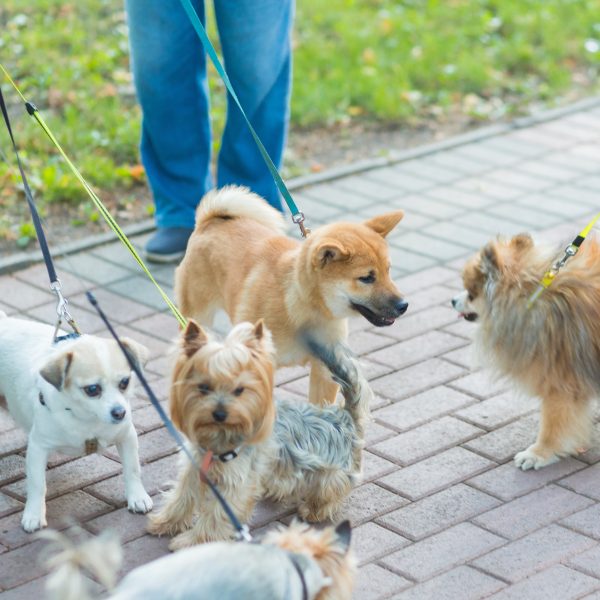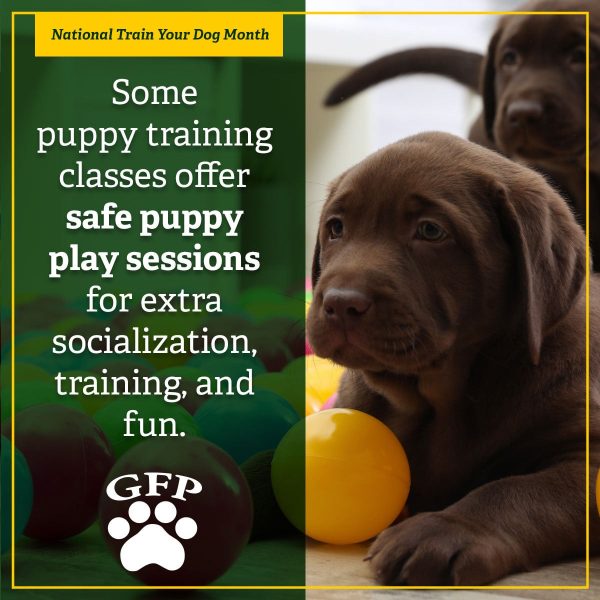How to Socialize a Puppy

Training and socialization early and often are important for every puppy in order to grow into well-rounded, and often well-behaved, dog. As important as this is for every dog, it’s also overlooked by many dog owners, which results in a variety of behavioral issues and frustrations. In worst case scenarios, lack of socialization can result in an aggressive dog that bites and ends up needing to be surrendered or put down. The best way to give your puppy the best chance of becoming a confident dog is to properly train and socialize them. Here’s what you need to know about why socialization is important and how to socialize a puppy:
Why is Socialization Important?
The world can be a scary place for a small puppy. They’ll be faced with new experiences, new smells, strange animals and dogs, strange people, and more. Socialization helps introduce them to new experiences and situations early on so they can be confident and comfortable in new situations later in life. This is the time where it is critical that they know they are okay when faced with something or someone new and that they don’t need to be afraid.
Early socialization helps a dog with healthy psychological growth and with developing coping skills. Dogs who are socialized properly as puppies tend to exhibit healthier behaviors, are more outgoing and confident and tend to be more stable overall. A well-socialized dog will be curious about new situations and take them in stride while a poorly socialized dog will tend to react with anxiety and fear, which can lead to aggressive responses. Socialization alone won’t result in a well-behaved dog, as you need to train your dog and teach them rules and boundaries, but it certainly helps.
When Should You Start Socializing Your Puppy?
You should start socializing your puppy as early as possible. Ideally, socialization begins before you bring your puppy home. But, you don’t have a lot of control over that; although this is one of the things to look for in reputable dog breeders. Most puppies are adopted when they are between 8 and 16 weeks of age and this is the perfect time to start or continue socializing your puppy.
Socialization is also not something that stops once your puppy grows up. It’s something that should continue, along with training, throughout your dog’s life. Your dog is your companion and you should continue to do new things and experience new things with them. You and your dog will both be happier for it.
How Can You Socialize a Puppy?
Socializing a puppy is all about taking them to new places, letting them meet new people, and experiencing new things. The most important thing is to keep an eye on your puppy and ensure the experiences with you stay positive.
It’s okay if your puppy gets overly tired or starts to seem frightened – that’s normal and it’s important for you to reassure them. If they are starting to get tired, praise them for their good behavior and head home. If they start to feel frightened, it’s important for you to reassure and comfort them so they don’t associate a fear response with that new situation or experience.
Since socializing a puppy is all about introducing them to new things in a positive way, there are a lot of things you can do to provide that broad range of positive experiences. Here a just a few ideas for how to socialize a puppy to get you started:
1. Enroll in Puppy Training Classes
Puppy training classes are a great way to start socializing your puppy while also brushing up on your training skills. Not only can this help strengthen the bond between you and your puppy, but it also provides a secure setting for them to experience new people, other dogs, and a variety of other situations.
Plus, you’ll leave each class with plenty of useful tips and insights you can use at home to further bond with your puppy, train them, and socialize them. These are just a few of the benefits of puppy training classes.
2. Take Walks in New Places
You and your puppy may have a favorite or designated walk route for their potty breaks and scheduled walks, but that doesn’t mean you can’t take exploratory walks in new places. Not only can a relaxing, exploratory walk give you and your dog something active to do together, but it can also help you build a bond with your dog and strengthen it.
These walks are meant for you and your puppy to explore and experience a new place together, so make sure you bring some patience and build in some time for your puppy to sniff around and check things out. These can also be great opportunities to practice leash training your puppy.
3. Meet Different People
Taking walks in new places is a great way for your puppy to meet new people as are puppy training classes. You can also check out the local dog park or see if there are any dog meetups in your area. All of these can be good ways for your dog to gain experience meeting a ton of different people and helping them become more comfortable when confronted with strangers.
During these meetings, it’s important to pay attention so that a well-meaning child doesn’t accidentally hurt your pup or an unknown dog causes distress for them. Sometimes, it makes sense to start with people you know and then branch out to other dog owners or friendly strangers from there. This is one of the tips to help your shy dog interact with other dogs and people.
4. Try New Activities
Aside from the basics, this is also a great time to try new activities with your pooch. Introduce them to water and see if they like going swimming with you. Test out going on hikes or visiting the beach. Once they know their manners inside the house, test taking them on a trip to the Starbucks drive-thru for a “puppuccino” or visiting an outdoor cafe.
Think about new activities you want to try, identify those that are dog-friendly, and then take your dog along to enjoy them with you. As long as your dog has their training down and responds well to commands, these trips out into public should be a great time for you both!
Socialization is so important to the health and wellbeing of your puppy. It’s not too early to start and it’s a process that should be ongoing throughout your dog’s life. With training and socialization early on, plus these tips on how to socialize a puppy, you can help put your puppy on the path to successful doghood.

